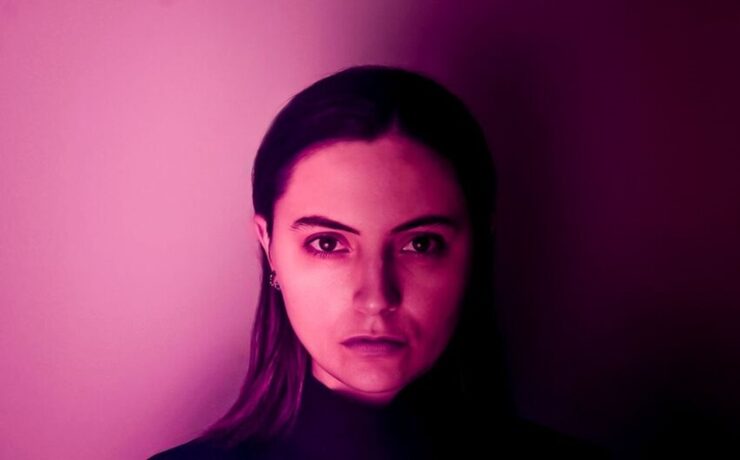Colliding at the intersection of Dystopian technology, Queer sentimentality, and Activist-led intersectionality, Ants and Other Strong Things has a lot to say about the state of the World in 2024. Like all good dystopian dramas, it projects its setting into the future but has much more to say about our society today – how Queer people’s rights are being silently and covertly withdrawn, and how surveillance of our online data connects us to a kaleidoscope of political decisions far beyond our control.
Above all, however, what shines through is the fizzing chemistry and domineering performances of the two main characters, Charlie (Magdaléna Škerenčák) and Maya (Manuela Tabarés), who enter into a loving yet surveilled Queer relationship after a chance meeting at an underground bar. Such relationships are monitored by the International Cyberspace Order (ICO), a body funded by shady tech billionaires that seems to have all but replaced the police force, as well as providing food and resources in the un-named country the piece is set within.
Maya abandons her middle class life to pursue her newfound love, while Charlie is committed to her first ‘Count’, in which she is scrutinised by the ICO over her life decisions and memories. Before long, both find themselves down parallel rabbit holes that will test the boundaries of their relationship, their commitment to each other, as well as the very things that make up their identity.
The piece’s inspirations are present throughout – with motifs of Orwell’s 1984, Huxley’s Brave New World, and Kubrick’s Clockwork Orange present but not overbearing. Ants and Other Strong Things is a well thought-out queering of the dystopian genre that seeks to bleed onto the world an omnipresent repression and oppression of the civil rights of LGBTQIA+ people. Writer-Director Raynar Rogers deliberates a compelling story-world, with worldbuilding taking up a fair chunk of the early piece. This is elaborated both in highly detailed set and costume pieces all bearing the logo of the ICO, and fantastically crafted visual projections which are equal parts claustrophobic and bleak.
Before long, we draw focus instead on the intimacies of Charlie and Maya’s relationship, which is where this show hits its highest notes, and packs its biggest punches both through humour and emotive drama. In the bedroom of Charlie’s flat, safe from the drones surveilling them in the outside world, Maya and Charlie explore all corners of each other’s minds and bodies. They roll around over each other, chastise and tease one another, admonish and admire one another, and delve deep into each other’s psyche to create a burgeoning relationship. This is soon tested by family dramas both at home and abroad, as well as the state’s overbearing attempts to crush the life they are building together.
Consciousness both of a political and emotional nature is drawn out in moments of clear and lucid intersectionality. Those which deliver the heaviest blows include a scene where Charlie is walking home and is asked by an ICO application on her phone whether a young black child is a ‘threat’ to her, and in the scenes that explore Maya’s worldview as a Queer immigrant in this repressive society. These details prove a strong commitment to political theatrical practice not simply as a method of messaging but as a means of revelation and praxis. While it would be easy for this to come across preachy, the dedication to the crafting of the world which Maya and Charlie inhabits naturally contains these ghastly intersections of oppression. It’s a masterful achievement to see such a thorough exploration of all suppressive elements of surveillance capitalism.
Equally well-explored is the formation of Queer identities, envisioned in monologue-based scenes where Charlie and Maya recount their youth, later connected back to them as their families learn of their relationship. Maya is resistant to identify herself as a lesbian, or as bisexual, or as anything in fact, and she travels on an arc which sees her come to recognise how identity politics is weaponised and brutalised by oppressive forces. Her character arc is especially strong, and delivered passionately by Tabarés, who shifts into the protagonist’s role by the piece’s conclusion.
While the set and prop pieces are indeed wonderfully created, I can’t help but feel they also become a hinderance to the performers. Large white crates are stacked and shoved around the stage in moments of low light in between scenes, which loses some of the fluidity achieved in the drama. These sections could either be better utilised through integrating more projections, or the boxes could be shelved entirely to provide a better flow between scenes. Equally, the piece is quite long for a Fringe performance, and could be shaved down a little here and there to offer conciseness, and greater impact.
Lucid, heart-breaking, and cathartic. Ants and Other Strong Things is an intersectional dystopian drama elevated by mighty, soulful performances and tight chemistry.
Recommended Drink: Grab yourself an ICO cocktail, or head down to Lil’s underground bar for something a little stronger. The choice is yours.
Catch Ants and Other Strong Things as part of Prague Fringe at A Studio Rubin until the 1st June. Tickets are available through the Prague Fringe Box Office.









